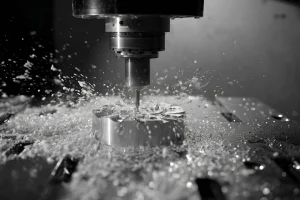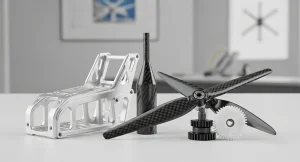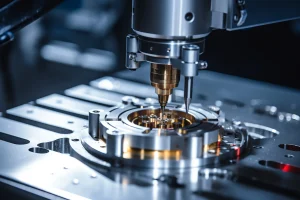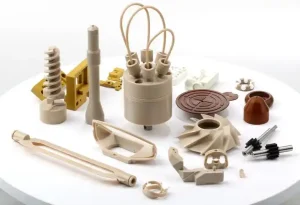Introduction
In the realm of CNC machining, the issue of oil leakage in machining centers is a persistent headache for many operators. It not only disrupts the smooth running of production processes but can also lead to costly repairs and downtime. Fortunately, there are experts like rapidefficient in the field who have been tackling this problem with remarkable efficiency.
CNC machining centers are the workhorses of modern manufacturing, capable of producing highly precise components. However, when oil leakage occurs, it can throw a wrench into the entire operation. From minor seepages that go unnoticed initially to more significant leaks that can create a mess on the shop floor, the consequences vary but are almost always unwelcome.
rapidefficient has emerged as a key player in the CNC aluminum machining service sector. With a reputation for swift and effective solutions, they have been helping businesses get to the root of their oil leakage problems and implementing fixes that stand the test of time. In the following sections, we’ll delve deep into the common causes of oil leakage in CNC machining centers and explore how experts like rapidefficient are making a difference.
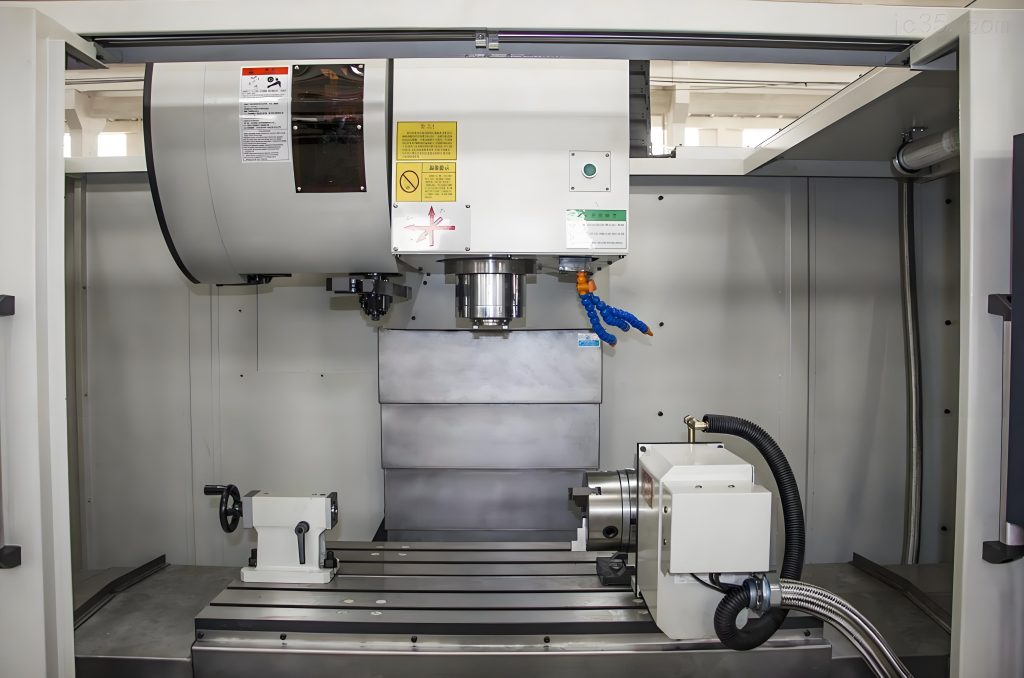
Common Causes of Oil Leakage
1. Worn Seals and Gaskets
One of the most prevalent reasons for oil leakage in CNC machining centers is the wear and tear of seals and gaskets. These components act as barriers, preventing the escape of lubricating oil from various parts of the machine. Over time, due to continuous exposure to high temperatures, pressure fluctuations, and mechanical abrasion, seals and gaskets can degrade. For instance, the rubber seals in spindle bearings may harden and crack, losing their flexibility and sealing ability. This can lead to a slow seepage of oil, which might go unnoticed initially but can escalate into a more significant problem if not addressed. In a busy manufacturing environment, where machines are running for extended hours, the lifespan of these seals is further reduced. If left unchecked, it can not only cause oil wastage but also contaminate the workpieces being machined, leading to quality issues.
2. Improper Installation
Even the highest quality seals and gaskets won’t function optimally if they aren’t installed correctly. Improper installation can occur in several ways. For example, during the assembly of a CNC machine, if the mating surfaces of two components are not thoroughly cleaned before installing a gasket, debris or burrs can prevent a proper seal, creating gaps for oil to leak through. Another common mistake is incorrect torqueing of bolts that hold the seals in place. If the bolts are tightened too much, it can damage the seal, and if they’re too loose, the seal won’t be compressed evenly, leading to leaks. In some cases, inexperienced technicians might misalign parts during installation, putting additional stress on the seals and causing them to fail prematurely. This highlights the importance of having trained and skilled personnel handle the installation and maintenance of CNC machining centers.
3. Excessive Oil Pressure
CNC machining centers rely on a precisely regulated oil pressure system to lubricate moving parts effectively. However, when the oil pressure exceeds the recommended levels, it can put undue stress on seals and other components, leading to leaks. There are several factors that can cause excessive oil pressure. A malfunctioning oil pump might deliver oil at a higher rate than necessary, overwhelming the system’s pressure relief mechanisms. Additionally, a blocked or faulty pressure relief valve, which is designed to release excess pressure, can prevent the system from self-regulating. This can be a dangerous situation as it not only leads to oil leakage but can also cause damage to bearings and other critical components due to over-lubrication. Regular maintenance and pressure checks are essential to detect and rectify such issues before they cause significant damage.
4. Vibrations and Mechanical Stress
The operation of a CNC machining center generates vibrations. These vibrations, combined with the mechanical stress from the cutting forces and rapid movement of axes, can loosen bolts, displace components, and damage seals. For example, the vibration from a high-speed spindle can cause the retaining nuts of seals to gradually work themselves loose over time. Similarly, the stress on the machine structure during heavy machining operations can cause minute deformations in the housing, creating gaps where oil can escape. Parts like the tool changer mechanism, which undergoes frequent and rapid movements, are particularly susceptible to such issues. To mitigate these problems, proper machine design, including vibration damping features, and regular inspection of critical components for signs of displacement or damage are necessary.
5. Contaminated Oil
The quality of the lubricating oil used in CNC machining centers is crucial. If the oil becomes contaminated, it can accelerate the wear of seals and other components, leading to leaks. Contaminants can enter the oil system in various ways. Metal chips generated during the machining process can find their way into the oil reservoir, acting as abrasive particles that damage seals and bearings. Water contamination is another common issue, especially in humid environments or if there are coolant leaks in the machine. Water in the oil can cause rust formation, which corrodes the internal surfaces of the machine and degrades the seals. Regular oil changes, proper filtration, and maintaining a clean working environment are key to preventing oil contamination and the subsequent leakage problems.
The Impact of Oil Leakage on CNC Machining Centers
1. Reduced Machining Accuracy
The precision of CNC machining centers is of utmost importance, especially in industries like aerospace, automotive, and electronics where tight tolerances are required. Oil leakage can severely compromise this precision. Lubricating oil is essential for the smooth operation of moving parts such as spindles, ball screws, and linear guides. When there is a leak, the proper lubrication and cooling of these components may be insufficient. For example, in high-speed machining, a lack of adequate lubrication in the spindle can lead to increased friction and heat generation. This, in turn, can cause the spindle to expand slightly, altering the tool’s position relative to the workpiece. As a result, the dimensions of the machined part may deviate from the intended specifications, leading to scrap or rework. In industries where even a micrometer of error can render a component useless, the consequences of oil leakage on machining accuracy can be extremely costly.
2. Increased Downtime and Maintenance Costs
When oil leakage is detected, the machining center often needs to be shut down to address the issue. This downtime can disrupt production schedules and lead to missed deadlines. Depending on the complexity of the problem and the availability of replacement parts, the machine could be out of commission for hours, days, or even weeks. During this time, not only is production halted, but there are also additional costs associated with labor, as technicians work to diagnose and repair the leak. Moreover, the cost of replacement parts, such as seals, gaskets, and any damaged components, can add up quickly. In contrast, implementing preventive maintenance measures to avoid oil leakage in the first place can save significant amounts of money in the long run. By regularly inspecting and servicing the machine, potential leaks can be identified and fixed before they cause major disruptions.
3. Potential Damage to Electrical Components
Another hidden danger of oil leakage in CNC machining centers is the potential damage it can cause to electrical components. Oil can seep into control cabinets, motor housings, and other areas where electrical and electronic parts are located. The insulating properties of oil can be detrimental to the proper functioning of these components. For instance, if oil coats circuit boards, it can create short circuits, leading to malfunctions or even permanent damage to the electronics. Sensors, which play a crucial role in maintaining machining accuracy and monitoring the machine’s performance, are particularly vulnerable. A malfunctioning sensor due to oil contamination can provide incorrect feedback to the control system, resulting in further errors in the machining process. Preventing oil leakage is, therefore, not only about maintaining mechanical integrity but also safeguarding the expensive electrical and electronic systems that power modern CNC machining centers.
How Rapidefficient Addresses Oil Leakage Issues
1. High-Quality Components and Precision Installation
rapidefficient places a strong emphasis on using only the highest quality seals and gaskets. They source materials from trusted suppliers who have a proven track record of providing components that can withstand the rigors of CNC machining environments. For example, their seals are often made from advanced rubber compounds or specialized polymers that offer enhanced resistance to temperature extremes, chemical degradation, and mechanical stress.
When it comes to installation, rapidefficient’s technicians follow strict procedures. Before installing a seal or gasket, they meticulously clean the mating surfaces, removing any traces of debris, burrs, or old sealant. This ensures a perfect fit and a proper seal. The bolts are then torqued to the manufacturer’s specifications using calibrated tools, preventing over-tightening or under-tightening. This precision installation process significantly reduces the likelihood of leaks due to improper installation and extends the lifespan of the sealing components.
2. Regular Maintenance and Monitoring
One of the key services rapidefficient offers is a comprehensive maintenance program. They understand that preventive maintenance is far more cost-effective than reactive repairs. Their technicians regularly visit client sites to inspect CNC machining centers. During these inspections, they check for signs of oil leakage, monitor oil levels and quality, and examine the condition of seals and other critical components.
Using advanced diagnostic tools, such as ultrasonic leak detectors and infrared thermometers, they can identify potential issues before they become major problems. For instance, the ultrasonic leak detector can pick up the faintest sounds of oil escaping, even if the leak is not yet visible. If any abnormalities are detected, rapidefficient’s team can take immediate corrective action, whether it’s tightening a loose bolt, replacing a worn seal, or adjusting the oil pressure. This proactive approach minimizes downtime and keeps the machining centers operating at peak efficiency.
3. Customized Solutions for Different Machining Centers
Every CNC machining center is unique, with different operating parameters, workloads, and age. rapidefficient recognizes this and offers customized solutions to address oil leakage issues. They work closely with clients to understand their specific requirements and the characteristics of their machines.
For a high-volume production facility with older machining centers experiencing chronic oil leakage, rapidefficient might recommend a combination of retrofitting with upgraded seals, installing additional vibration dampening measures, and increasing the frequency of maintenance visits. In contrast, for a newly installed state-of-the-art machining center, the focus might be on optimizing the initial setup, providing operator training to prevent improper use that could lead to leaks, and setting up a long-term monitoring plan.
By tailoring their solutions, rapidefficient has successfully resolved oil leakage problems for a wide range of clients. In one case, a precision engineering company was facing significant quality issues due to oil contamination caused by leaks in their machining centers. rapidefficient’s team analyzed the situation, implemented a custom seal replacement and maintenance schedule, and within a few weeks, the company saw a drastic reduction in scrap rates and an improvement in overall productivity.
Conclusion
Oil leakage in CNC machining centers is a complex issue with multiple causes and far-reaching consequences. However, with the expertise and services provided by companies like rapidefficient, it is a problem that can be effectively managed and mitigated. By addressing the root causes, implementing preventive maintenance, and offering customized solutions, rapidefficient is helping CNC machining operations run smoothly, ensuring high-quality output and minimizing costly downtime.
If you’re facing oil leakage issues in your CNC machining centers or simply want to ensure the long-term reliability of your equipment, consider reaching out to rapidefficient. Their team of professionals is ready to provide you with the support and solutions you need to keep your machining processes on track. Don’t let oil leakage hold back your production capabilities – trust the experts to get the job done right.
Conclusion
In conclusion, oil leakage in CNC machining centers is a multifaceted issue that demands attention. By understanding the common causes such as worn seals, improper installation, excessive oil pressure, vibrations, and contaminated oil, operators can be better equipped to prevent and address these problems. The consequences of oil leakage, including reduced machining accuracy, increased downtime, and potential damage to electrical components, can be detrimental to production processes and the bottom line.
rapidefficient stands out in the CNC aluminum machining service landscape by providing comprehensive solutions. Their focus on high-quality components, precision installation, regular maintenance, and customized approaches tailored to each machining center’s unique needs has proven effective in combating oil leakage. Through their expertise, businesses can minimize disruptions, enhance productivity, and safeguard the integrity of their CNC machining operations.
To sum it up, prevention is key when it comes to oil leakage. However, when issues do arise, having a reliable partner like rapidefficient by your side can make all the difference. Don’t let oil leakage slow down your production – reach out to the experts and keep your CNC machining centers running smoothly.



